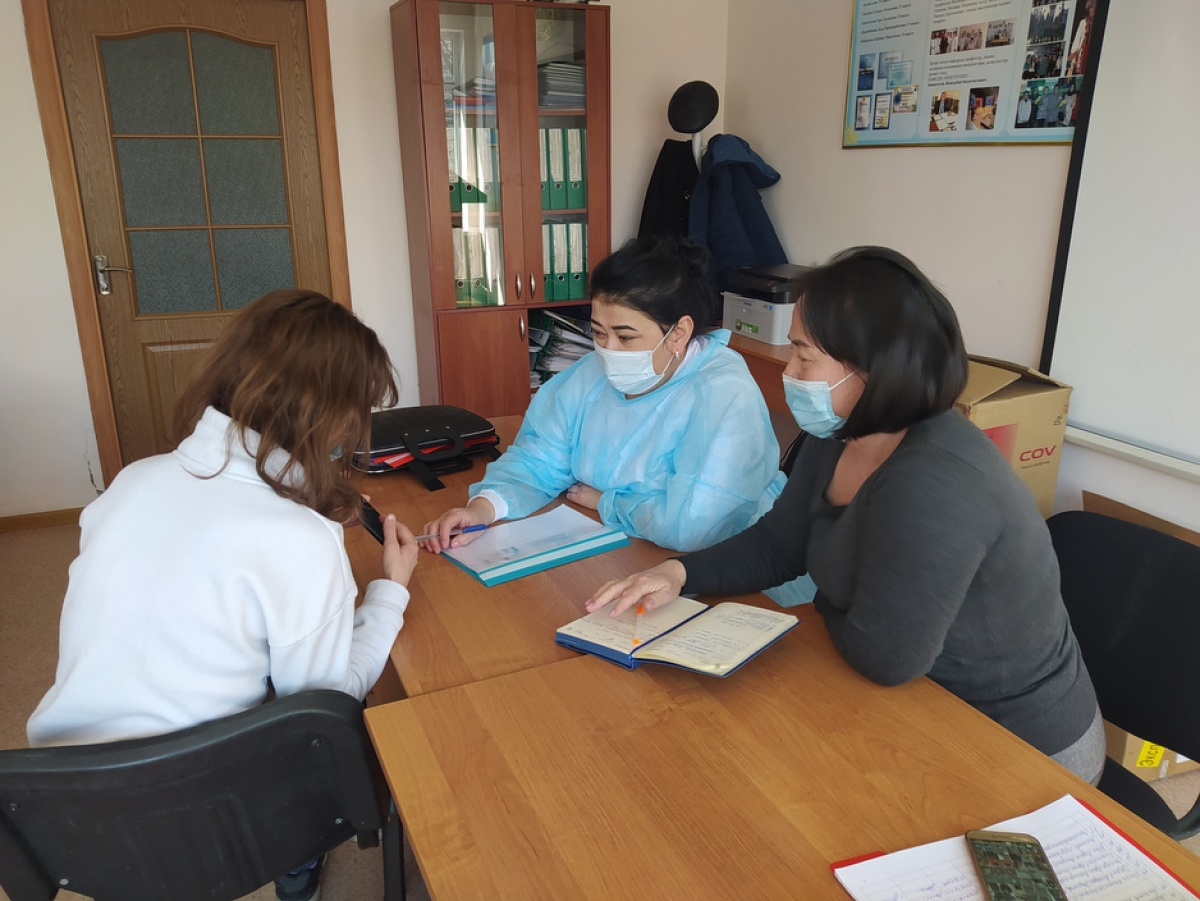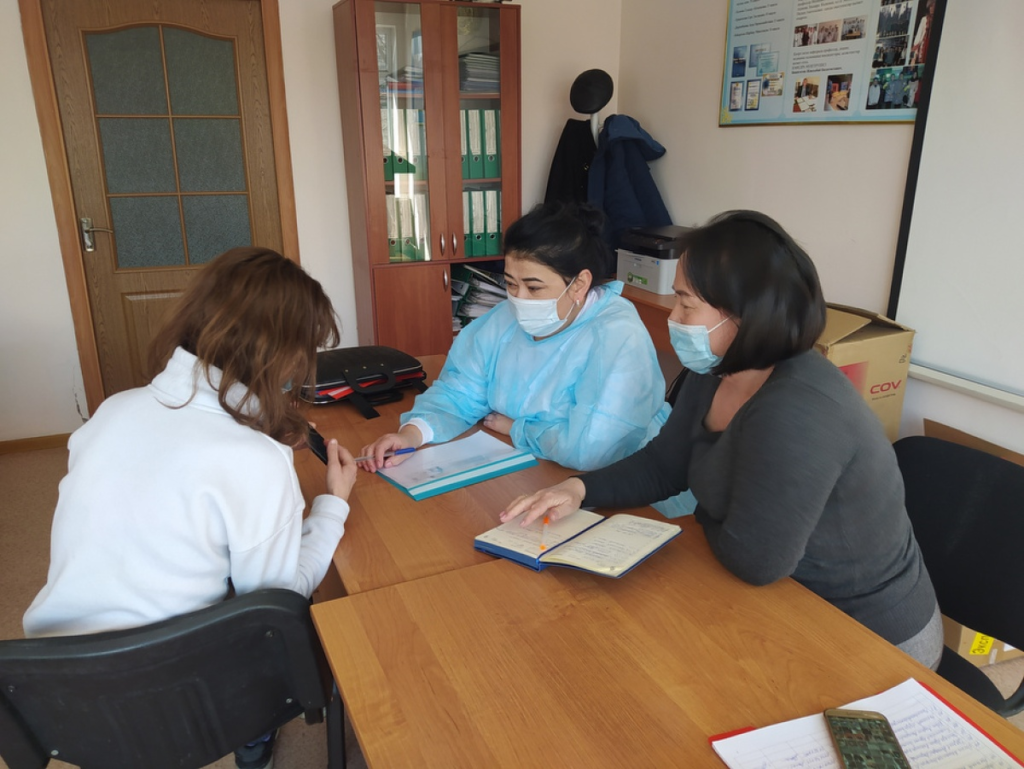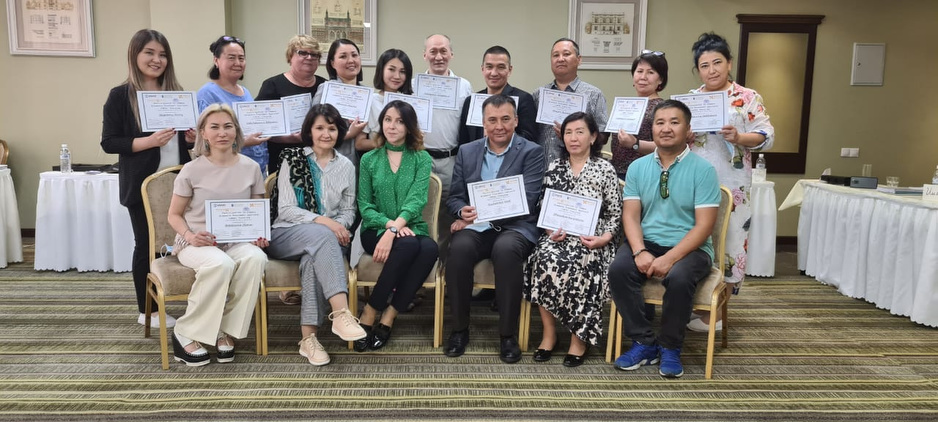In Kazakhstan, Caring For Tuberculosis Patients’ Mental Health

PIH integrates psychological first aid into pandemic response
Posted on Oct 8, 2021

Tuberculosis, one of the world’s most deadly diseases, kills nearly 4,000 people per day and has a daunting list of physical symptoms—coughing, chills, weight loss, night sweats. But lesser known are its effects on mental health.
Studies have shown that tuberculosis often comes with mental health conditions such as depression—a reality that clinicians, psychologists, and social workers see first-hand in the parts of Kazakhstan where PIH works.
To tackle these challenges, PIH launched a mental health program in Kazakhstan in January 2020 to provide free, comprehensive mental health care to patients living with tuberculosis—furthering PIH’s mission to advance health care as a human right and ensure that patients can access care for their mental health and well-being. The program was established through the support of the Many Voices Collaborative in Community-Based Mental Health Care, a cross-site initiative begun in 2018 to support the development of mental health services across the countries where PIH works.
Psychological First Aid
Kazakhstan, a landlocked nation of 18 million in Central Asia, has one of the world’s highest burdens of multidrug-resistant tuberculosis (MDR-TB)—a variant of tuberculosis that is resistant to most medications. Despite the country’s economic growth since its independence from the Soviet Union in 1991, half of the population lives in rural, impoverished areas with little access to health services and MDR-TB has increased, putting patients’ physical and mental health at risk.
PIH has worked in Kazakhstan since 2010, focused on caring for patients with MDR-TB and XDR-TB, an even more severe drug-resistant variant of tuberculosis. That work spans 7 regions of the country and includes people who are disproportionately at risk of contracting tuberculosis, such as health workers and caregivers of TB patients. And it has continued amid COVID-19, with PIH working with the Ministry of Health to deliver food support, medications, and care for patients living with TB and HIV.
Many Voices is the latest chapter in PIH’s ongoing work in Kazakhstan.
Launched in January 2020, the project integrates mental health care into the tuberculosis response, providing counseling, monitoring, and food and transportation support to MDR-TB patients in their homes and at clinics, reaching those who would otherwise be untreated.
“The project provides psychological support and social services for TB patients,” says Serik Kozhabekov, coordinator of PIH’s mental health program in Kazakhstan. “It takes into account the duration of patients’ MDR-TB treatment, as well as those who are most vulnerable, which improves adherence to TB treatment and treatment outcomes.”
One of the key tools of the project is psychological first aid: an intervention from the World Health Organization designed to help provide support to people in distress caused by emergencies and traumatic events—support that has been all the more critical during a pandemic that has killed more than 15,900 and infected 969,000 in Kazakhstan.

Reaching Patients, Saving Lives
Since its launch, the Many Voices Collaborative has strengthened mental health care for thousands of patients globally. In the first six months in Kazakhstan alone, the project served 29 patients, helping them care for their mental health and follow their TB treatment plans. By mid-2021, the project had served 114 clients from among the most vulnerable TB patients. As part of the COVID-19 response, the PIH team conducted 455 virtual mental health consultations with patients and their families and friends, visited 105 patients in person, and trained 238 health workers in psychological first aid—trainings that were held in Russian and adapted to local contexts. Because of partnerships with local nonprofits, 35 TB clients were able to receive social services from the government.
In addition to medical care, the team helped patients access food and transportation, through food vouchers and reimbursement for travel expenses—essential resources, also known as social support, that can make or break patients’ ability to access care, especially in impoverished areas where taxi fares and time away from work can wreak financial havoc on families already struggling to make ends meet.
This year, the team hopes to reach hundreds more patients with mental health care and social support. In early 2021, the project conducted psychological first aid trainings for 238 health workers in the cities of Almaty and Karaganda, equipping them to provide screening and care for depression and other mental health conditions among the patients they serve.
And leaders of the project hope these achievements are just the beginning.
The team plans to launch more programming in Karaganda, including trainings for health workers and psychologists in primary health centers. It also aspires to pilot a mental health intervention for adolescents, focused on suicide prevention and suicide outreach.
“Health professionals should have a common understanding that without mental health, there is no health at all,” says Kozhabekov. “We should strive to ensure that all people with mental health problems have equal access to mental health diagnosis and mental therapy services.”

Originally published on pih.org



